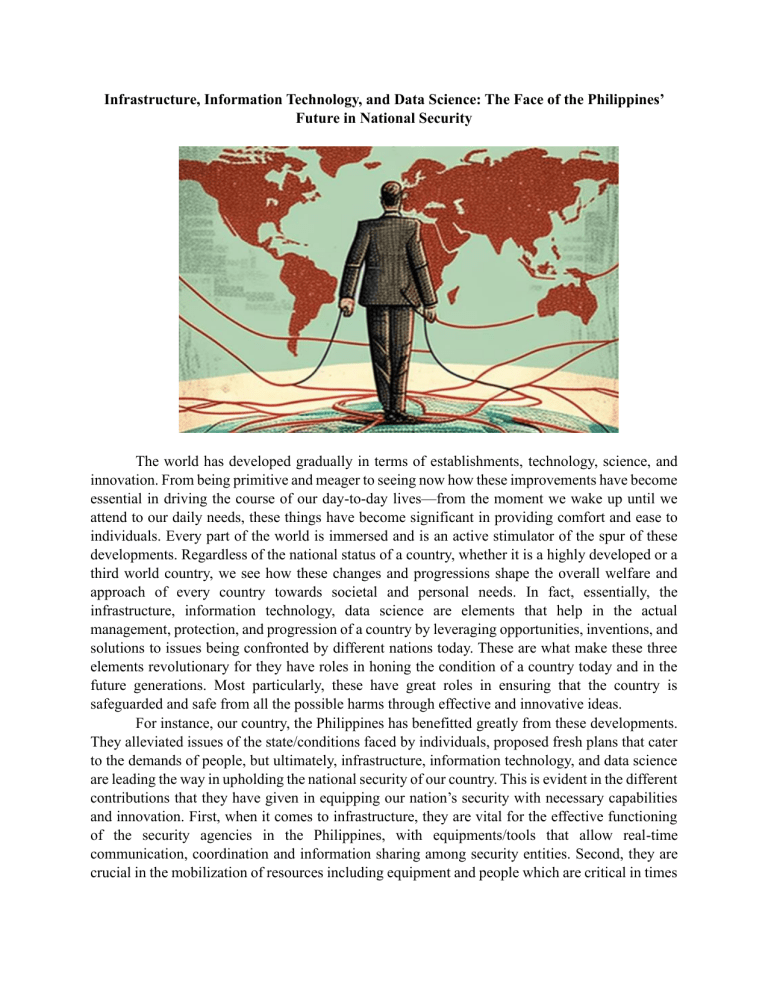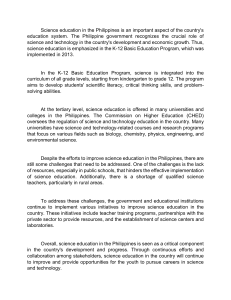Philippines National Security: Infrastructure, IT, Data Science
advertisement

Infrastructure, Information Technology, and Data Science: The Face of the Philippines’ Future in National Security The world has developed gradually in terms of establishments, technology, science, and innovation. From being primitive and meager to seeing now how these improvements have become essential in driving the course of our day-to-day lives—from the moment we wake up until we attend to our daily needs, these things have become significant in providing comfort and ease to individuals. Every part of the world is immersed and is an active stimulator of the spur of these developments. Regardless of the national status of a country, whether it is a highly developed or a third world country, we see how these changes and progressions shape the overall welfare and approach of every country towards societal and personal needs. In fact, essentially, the infrastructure, information technology, data science are elements that help in the actual management, protection, and progression of a country by leveraging opportunities, inventions, and solutions to issues being confronted by different nations today. These are what make these three elements revolutionary for they have roles in honing the condition of a country today and in the future generations. Most particularly, these have great roles in ensuring that the country is safeguarded and safe from all the possible harms through effective and innovative ideas. For instance, our country, the Philippines has benefitted greatly from these developments. They alleviated issues of the state/conditions faced by individuals, proposed fresh plans that cater to the demands of people, but ultimately, infrastructure, information technology, and data science are leading the way in upholding the national security of our country. This is evident in the different contributions that they have given in equipping our nation’s security with necessary capabilities and innovation. First, when it comes to infrastructure, they are vital for the effective functioning of the security agencies in the Philippines, with equipments/tools that allow real-time communication, coordination and information sharing among security entities. Second, they are crucial in the mobilization of resources including equipment and people which are critical in times of deploying forces during crisis. Lastly, infrastructures have a crucial role in national security as they serve as homes/assets in times when concerns/threats arise. Next is Information Technology. We see the growing trend of information technology here in the Philippines, with more graduates, opportunities, research, and ideas concocted. With this, it entails a strengthened national security in the country. First, IT is crucial in the protection of networks, regulation of cyberspace, monitoring of activities, sensitive data, and building critical cyber infrastructures that are resilient from cyberattacks. Next, they are helpful in the collection, processing, and analyzation of intelligence data and this is seen in different innovations like advanced analytics, AI, and machine learning which help in the identification of patterns, threats, and risks. Lastly, IT is integral in command and control operations—allowing military and security forces to effectively, innovatively, and efficiently accomplish their missions. Data Science is the last important element that plays a role in upholding our national security. This is closely linked with information technology as it employs the same skillsets and operational mechanisms. Its role includes (1) helping in the analyzation of large datasets to identify potential threats to the Philippines’ national security—this will help in the anticipation and mitigation of risks before they worsen. Second, they help the intelligence agencies act more responsibly and swiftly with data being sent and coordinated for purposes of prevention and response to the issues against national security. Lastly, data science will contribute greatly to ensuring that systems access is not easily manipulated through the development of identity verification; this will help in national security as it prevents the possible impact of threats to vulnerable areas, individuals, and agencies. Truly, infrastructure, information technology, and data science will be the face of the Philippines’ future in national security as these three will be the backbone in the maintenance, strengthening, and protection of every entity in our country. The integration and continuous improvement of these will help us address more national security issues and build stronger facilities. Furthermore, with these three we recognize that we are able to guarantee safety and address the issues that our country will face more effectively and efficiently. From this we recognize the role of each element in forming a robust and interconnected system that will enable an improved system of communication, rapid response to threats, and development of systems that emit the abilities to anticipate and prevent national security issues. With the continuous progress of these three, the Filipino people and the Philippines in general are assured of bright future, one that is free from fear, damage, and threats. As Paul Kagame stated “national security is vital for economic and social progress,” hence, only when we begin to realize and this can we move forward not just as an individual, but as a nation of freedom, power, and growth.



